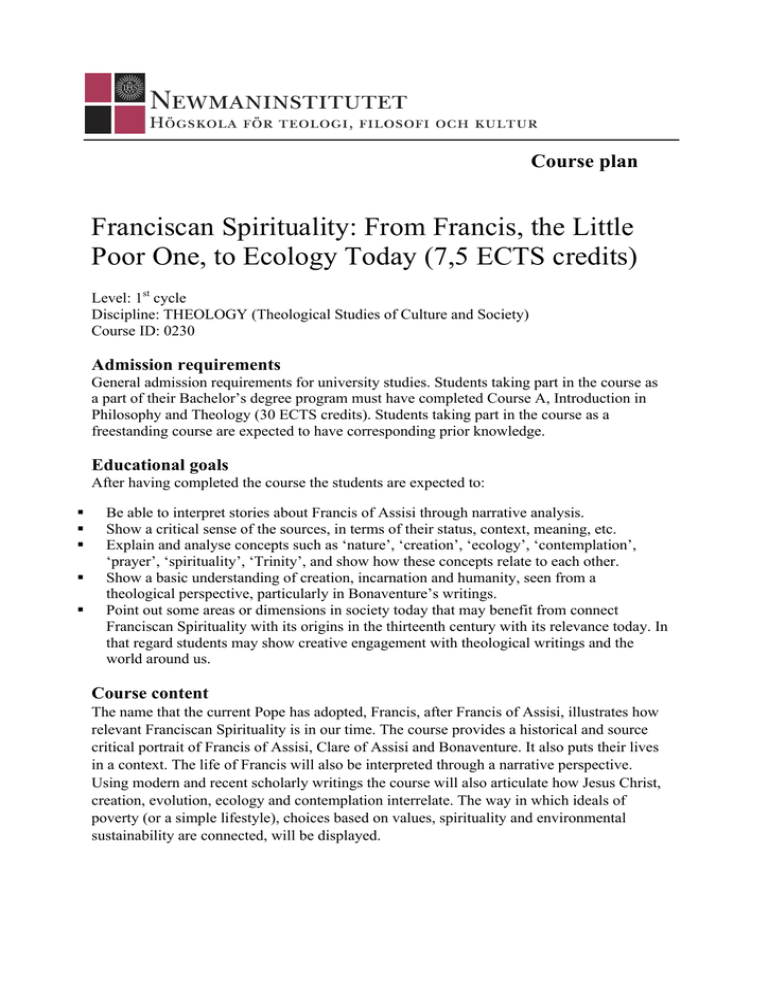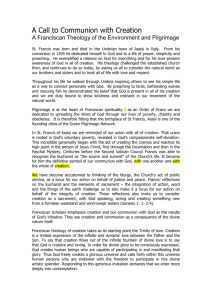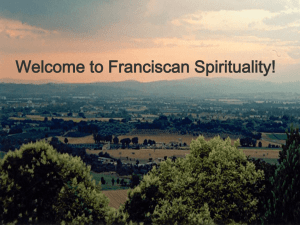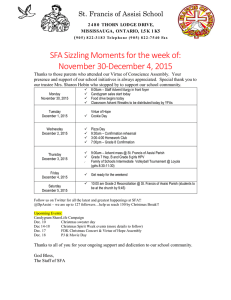Franciscan Spirituality: From Francis, the Little Course plan
advertisement

Course plan Franciscan Spirituality: From Francis, the Little Poor One, to Ecology Today (7,5 ECTS credits) Level: 1st cycle Discipline: THEOLOGY (Theological Studies of Culture and Society) Course ID: 0230 Admission requirements General admission requirements for university studies. Students taking part in the course as a part of their Bachelor’s degree program must have completed Course A, Introduction in Philosophy and Theology (30 ECTS credits). Students taking part in the course as a freestanding course are expected to have corresponding prior knowledge. Educational goals After having completed the course the students are expected to: § § § § § Be able to interpret stories about Francis of Assisi through narrative analysis. Show a critical sense of the sources, in terms of their status, context, meaning, etc. Explain and analyse concepts such as ‘nature’, ‘creation’, ‘ecology’, ‘contemplation’, ‘prayer’, ‘spirituality’, ‘Trinity’, and show how these concepts relate to each other. Show a basic understanding of creation, incarnation and humanity, seen from a theological perspective, particularly in Bonaventure’s writings. Point out some areas or dimensions in society today that may benefit from connect Franciscan Spirituality with its origins in the thirteenth century with its relevance today. In that regard students may show creative engagement with theological writings and the world around us. Course content The name that the current Pope has adopted, Francis, after Francis of Assisi, illustrates how relevant Franciscan Spirituality is in our time. The course provides a historical and source critical portrait of Francis of Assisi, Clare of Assisi and Bonaventure. It also puts their lives in a context. The life of Francis will also be interpreted through a narrative perspective. Using modern and recent scholarly writings the course will also articulate how Jesus Christ, creation, evolution, ecology and contemplation interrelate. The way in which ideals of poverty (or a simple lifestyle), choices based on values, spirituality and environmental sustainability are connected, will be displayed. Teaching and examination Teaching is given by means of lectures and discussion seminars in Uppsala. Examination is taken in three ways: 1. Students are expected to do assigned readings, to participate actively in working sessions (20 per cent of the final mark); 2. Write one short essay of 2 500 words on a topic selected in agreement with the lecturer (40 per cent of the final mark). 3. The contents of the entire course will be examined through oral examination at the end of the course. (40 per cent of the final mark) The course is taught in English. The final paper is preferably to be written in English; it is, however, also permitted to write it in Swedish. Bibliography Primary sources Francis and Clare, The Complete Works, The Classics of Western Spirituality (New York, Paulist Press, 1982). Bonaventure, The Soul’s Journey into God, The Tree of Life, The Life of St. Francis, The Classics of Western Spirituality (New York, Paulist Press, 1978). Secondary sources Cunningham, Lawrence, Francis of Assisi: Performing the Gospel, (Cambridge U.K., Eerdmans Publishing Company, 2004). Delio, Ilia, Simply Bonaventure: An Introduction to His Life, Thought, and Writings (New York: New City Press, 2001). Robson, Michael J.P., Cambridge Companion to Francis of Assisi, (Cambridge University Press, Cambridge, 2012). See also ”Kursplaner: allmänna bestämmelser” (Course plans: General rules) Finalised 2014-12-08 Valid as 2015-01-20


